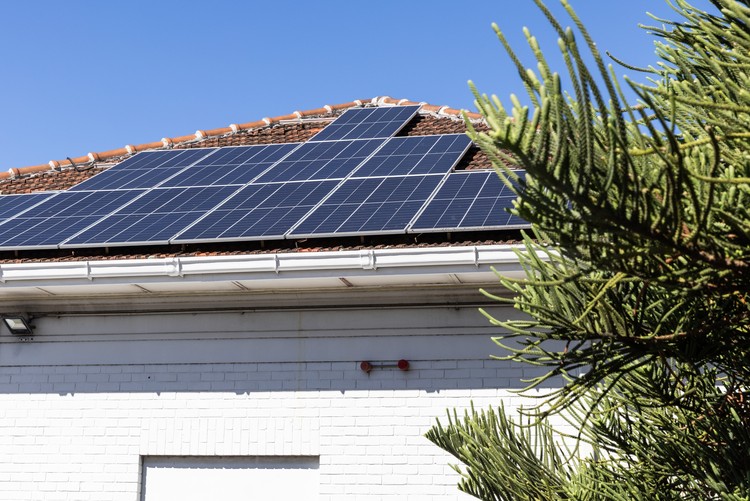Court victory for freedom of expression: IDC ungags itself
“There is no absolute right to be protected from being the subject of defamatory allegations” says acting judge
ARTsolar obtained a court order in March against a journalist and whistleblowers gagging them from making allegations against the company, which appears to claim on its website that it manufactures solar panels locally. Photo: Ashraf Hendricks
The Industrial Development Corporation of South Africa (IDC) has secured a court order in which it has now been excluded from a previous “gagging order”.
It will now be able to investigate allegations from whistleblowers that solar panel company ARTsolar imports its products from China and does not make them locally.
The IDC granted R90-million in funding to ARTsolar to set up its “Proudly South African” manufacturing plant in New Germany.
In a recent urgent application, ARTsolar obtained a “gagging order”, preventing the three “whistleblowers” — businessman and former ARTsolar client Brett Latimer and two former employees of the company, Kandace Singh and Shelendra Hansraj — from making “defamatory allegations” that it conducted business unethically or dishonestly and was not manufacturing its solar panels locally.
In the same interim order, Acting Judge Perlene Bramdhew barred journalist Bongani Hans — who had sent written questions to ARTsolar based on the allegations — from publishing them.
What was of concern to the IDC was that the order against Latimer, Singh and Hansraj specifically barred them from making the “defamatory” allegations to the IDC when it was already busy investigating their claims.
The IDC said it had a material interest in determining the veracity of the complaints against the company and the interim order was hampering its ability to investigate them.
It thus launched its own urgent application to be joined to the proceedings and to have the order, as it pertained to the IDC, to be set aside.
The matter, which was opposed by ARTsolar, was argued before Durban High Court Acting Judge Paul Wallis who handed down his judgment on Friday morning, granting the relief sought by the IDC and ordering ARTsolar to pay the costs of the application.
The IDC had argued that there was a potential for significant harm if it was not allowed to speak to Latimer and the two former employees given that the IDC had loaned the company R90 million.
This would delay the investigation into the complaint, which had been ordered by the Department of Trade, Industry and Competition.
The IDC said it should have been joined to the proceedings at the outset.
Judge Wallis agreed.
Judge Wallis said ARTsolar, in opposing the application, had lost sight of the fact that the IDC was not simply another lending institution with private law contractual rights; it was established by statute to boost economic growth.
He said while ARTsolar correctly contended that the loan agreements concluded between it and the IDC did not expressly identify that ARTsolar was to effect local production of the solar panels, the IDC alleged directly that the primary purpose was to enable ARTsolar to install the latest technology for the local production of solar panels.
On the issue of the reconsideration of the order, as it pertained to the IDC, ArtSolar had argued that the IDC was not entitled to receive defamatory information.
Judge Wallis said this submission “was seductive in its simplicity, but in my view, cannot be adopted without qualification”.
One qualification was that there were circumstances in which defamatory statements could be legitimately made through various forms of qualified privilege as well as circumstances peculiar to the press, or where it could be contended that the statements were both true and for the public benefit.
“There is no absolute right to be protected from being the subject of defamatory allegations.”
The judge said given the nature of the allegations against ARTsolar, now part of the “gagging order”, and the context of the aims and objectives of the IDC and the loan, “it appears to me at least prima facie that disclosures of the nature interdicted would be defensible either as being truthful and for the public benefit or as a form of qualified privilege”.
The order, as presently framed, precludes such disclosures to the IDC and, such a prohibition was not justified, he said.
The AmaBhungane Centre for Investigative Journalism and the Freedom of Expression Legal Network are contemplating joining the proceedings as amicus curiae because of the impact of the pre-publication gagging order against the journalist on freedom of the media.
Tshepo Ramodibe, the IDC’s head of corporate affairs, told GroundUp that the decision upholds the IDC’s right to “receive and assess information relevant to its funding and oversight responsibilities”. He said it It reinforces the principle that transparency and accountability are essential in commercial dealings, especially where public funds are involved.
Support independent journalism
Donate using Payfast

Don't miss out on the latest news
We respect your privacy, and promise we won't spam you.
Next: Immigrant workers face dismissal after winning CCMA case
Previous: Pensioner who was allocated an RDP house 15 years ago still lives in a mud hut
© 2025 GroundUp. This article is licensed under a Creative Commons Attribution-NoDerivatives 4.0 International License.
You may republish this article, so long as you credit the authors and GroundUp, and do not change the text. Please include a link back to the original article.
We put an invisible pixel in the article so that we can count traffic to republishers. All analytics tools are solely on our servers. We do not give our logs to any third party. Logs are deleted after two weeks. We do not use any IP address identifying information except to count regional traffic. We are solely interested in counting hits, not tracking users. If you republish, please do not delete the invisible pixel.

